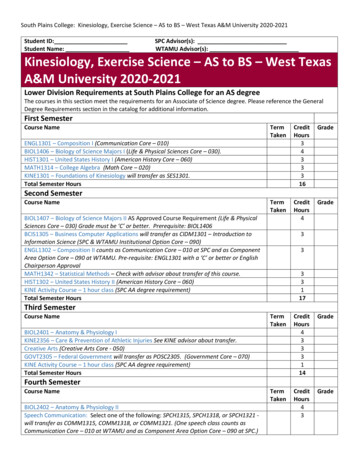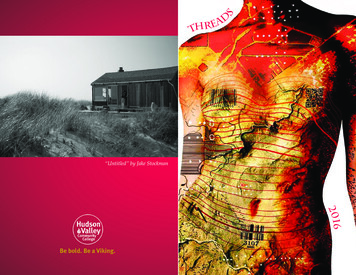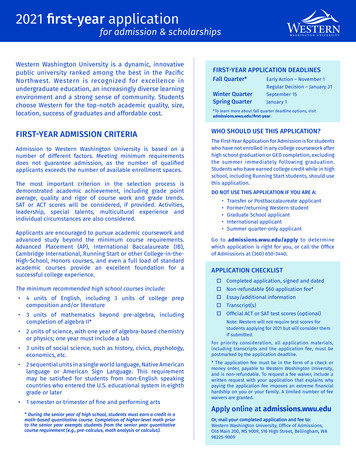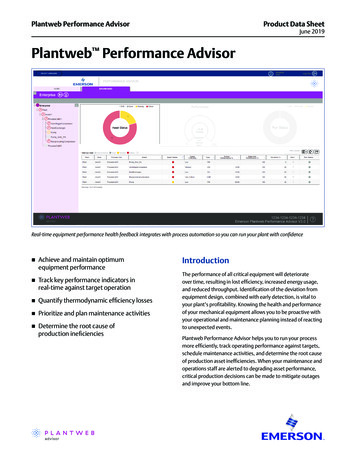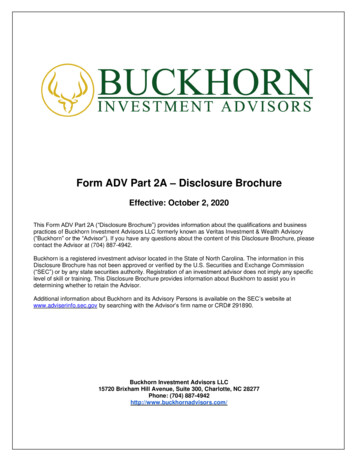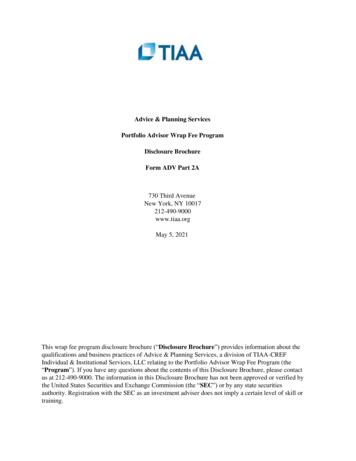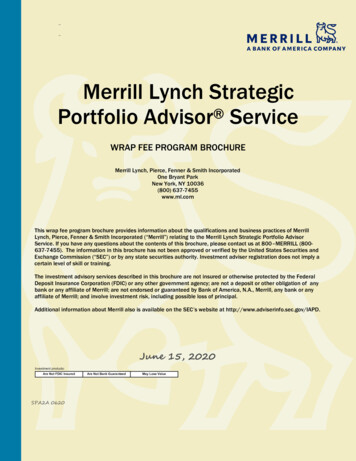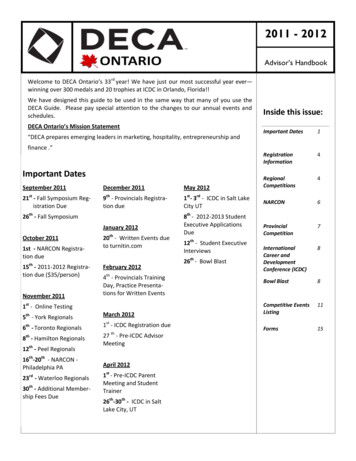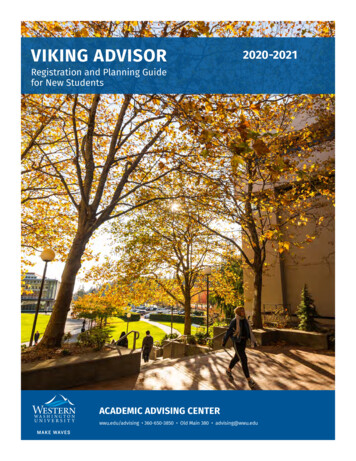
Transcription
VIKING ADVISOR2020-2021Registration and Planning Guidefor New StudentsACADEMIC ADVISING CENTERwwu.edu/advising 360-650-3850 Old Main 380 advising@wwu.edu
WELCOME TO WESTERN!We are so very glad you’ve joined the Western family! As you beginyour college journey here, there’s a lot to take in. This booklet, theViking Advisor, is designed to make some of your first decisionseasier—like how to choose your classes and get registered. It alsoincludes important information about requirements, declaring amajor, and our degree evaluation system, which will help you keeptrack of your academic progress.The Viking Advisor is created by the Academic Advising Centerin partnership with the Career Services Center—two offices wehope you’ll connect with early and often in your time at Western.The dedicated staff in those offices are here to help you planan academic experience which supports a great career aftergraduation.All of us in the Division of Enrollment and Student Services arehere to support your success. Now, more than ever, we are herefor you—although that looks a little different now than it has inyears past. No matter how or where we connect, though, our goalis always to support you. Don’t hesitate to reach out for helpwith whatever you need to succeed. I wish you an amazing yearof discovery!Melynda HuskeyVice President, Enrollment and Student Services
MAKE WAVES.VIKINGADVISORCONTENTSPlanning Your Western Experience. 2Academic Advising at Western. 4Graduation Requirements. 5Why GURs? . 6General University RequirementsCommunication. 7Quantitative and Symbolic Reasoning . 10Natural Sciences . 14Humanities . 21Social Sciences . 30Comparative, Gender, andMulticultural Studies . 37Registration and Academic PlanningDeclaring a Major. 52Tips for Developing a Balanced Schedule. 53Online Academic Planning Resources . 54Registration Timeline . 56Late Course Withdrawal . 56ClassFinder . 57Web4U. 57Registration Step-by-Step . 57Registration Waitlist . 58Transfer Equivalency Report . 58Degree Works . 59Guide to Campus Resources . 60General UniversityRequirements Checklist . back coverCOVER/THIS PAGE:South Campus Rhys LoganWESTERN WASHINGTON UNIVERSITY1
PL A NNING YOU R WESTER N E XPER IENCEFIRSTEXPLORE.SECONDCONNECT.Campus ResourcesWith Advising Attend every class and complete allassignments to maintain a good GPA. Develop relationships with academicadvisors, professors, and career counselors.Seek advising by 60 completed credits tostay on track with GUR progress and majordeclaration. Connect with the Tutoring Center (WL 280)to improve study skills and succeed in GURcourses.Talk with advisors and professors indepartments that interest you to buildrelationships and declare pre-major/Phase I status. Investigate possible minors. Meet with pre-professional and prehealthcare advisors if considering graduateor professional school.With Academic Events If undecided about a major, take a varietyof courses and attend Choosing andDeclaring a Major workshops. Attend a Western Abroad 101 session andvisit Education Abroad (MH 208) to explorestudy-abroad opportunities. Attend Career Services Center (OM 280)events including fairs showcasing careers,internships, graduate school and volunteeropportunities to develop professionalconnections and interests.Academics Begin to identify your interests, abilities,and values to explore majors and careers. Review Programs of Study in the onlineUniversity Catalog to learn aboutmajors, pre-requisites, and declarationrequirements. Connect with academic departmentsto explore majors and minors. Contactinformation available in the Programs ofStudy. Update your Academic Interest in Web4Uto reflect your current intended major(s),if not yet declared.Campus2 Identify ways to get involved in campuslife, like Residence Hall Council, studentclubs, and intramural sports. Look for the latest information aboutevents and student groups through theWestern Involvement Network (WIN).VIKING ADVISORWith Online and CareerResources Use Degree Works, an online degreeprogress tool found on MyWestern, tomonitor GUR completion and progress inmajor requirements. Take career assessments available throughthe Career Services Center to guideacademic and career decisions. Visit the Scholarship Center (OM 285) toresearch scholarship opportunities.
While students enter and leave Western at different times, here are recommendations to integrateacademic and career planning throughout your WWU student experience.THIRDENGAGE.FOURTHPREPARE.With AcademicsFor Graduation Declare your major by or before 90 credits,if possible. Maintain a good GPA, especially ifconsidering graduate school.Continue to use the online degree progresstool, Degree Works, and meet with advisorsto stay on track for graduation. Continue to build relationships withadvisors and professors to identify sourcesfor future letters of recommendation.Apply for graduation using the degreeapplication on the Registrar’s Officewebsite and Degree Works. Research and start graduate/professionalschool applications. Study for and takegraduate/professional school entranceexams.With Campus and CommunityFor Life after College Gain career-related experience throughinternships, volunteering and doingresearch projects with faculty. Maintain contact with professors andadvisors, particularly those who couldwrite letters of recommendation. Take on leadership roles in campus andcommunity organizations. Gain career-related experience anddevelop skills through internships andvolunteering.Continue to update your resume orportfolio to showcase your experience andqualifications. Connect with potential employers at careerfairs and networking events. Identify job search strategies and jobopportunities by using Career ServicesCenter resources and meeting with careercounselors. Take a career preparation class, such asMGMT 315. Learn one new practical skill that you canuse throughout your life, such as publicspeaking or Excel fluency. This can be donethrough a minor, class, club, or job and candiversify your skillset for future employers. Apply early to jobs and graduate/professional schools.With Career Preparation Connect with the Career Services Centerfor help with resume writing and interviewskills. Begin building a professional network bycreating a LinkedIn profile and connectingwith alumni through departmental networks. Attend quarterly career fairs and careerworkshops. Start planning early to make good useof the summer between your third andfourth year. Be aware of internship andjob deadlines.Created by Elizabeth Lopezfrom the Noun ProjectWESTERN WASHINGTON UNIVERSITY3
ACADEMIC ADVISING AT WESTERNThe best way to maintain academic success is to meet with an advisor.What does “A Shared Responsibility” Mean?Advising at WesternAcademic advising at Western Washington Universityis a shared responsibility. The Academic AdvisingCenter’s professional academic advisors, in collaboration with advisorsin Student Outreach Services, Western faculty, and departmental advisorshelp students develop meaningful educational experiences. Advisinginvolves students working closely with advising staff and faculty toestablish and complete academic goals. Advising provides opportunitiesto explore the intellectual side of your life, choose among educationaloptions, and develop plans to support academic and life objectives.Students are not assigned an advisor until they declare their major.Until then, the Academic Advising Center and Student OutreachServices are the primary sources for general advising. Students arestrongly encouraged to meet with their department of interest beforethey declare in order to find answers to major-related questions, declarea pre-major/Phase I major and establish relationships with their futuredepartment and faculty advisors.Advising Terms KeyAAC – Academic Advising CenterAS-T – Associate of ScienceCSC – Career Services CenterDTA – Direct TransferAgreementGUR – General UniversityRequirementsMPA – Math PlacementAssessmentSOS – Student OutreachServicesTER – Transfer EquivalencyReportWestern’s expectations of students may differ from other schools you’veattended. At Western, academic advisors and faculty are well preparedto assist you but rely on you to initiate advising conversations. Werecommend that students meet with an advisor at least once perquarter.Student ResponsibilitiesIt is your responsibility to take the initiative in makingadvising appointments. Meet with an advisor earlyand often to stay on track toward declaring a major andgraduating. You are responsible for becoming familiar with Western’sacademic policies which can be found in the University Catalog. Preparefor each advising appointment by reviewing advising resources such asthe University Catalog’s Programs of Study and academic departmentwebsites, and writing down your questions beforehand. As a reminder,email is an official form of WWU communication and you areresponsible for monitoring your student email account.Advisor ResponsibilitiesAcademic advisors have the responsibility of providingcurrent and accurate information about Western’s academicprograms and degree requirements. They also have theresponsibility of guiding you to become confident navigating Western’sprograms, resources, and policies.Where to go for Academic AdvisingThe Academic Advising Center (Old Main 380) and Student Outreach Services (Old Main 387) are resources for general ongoing advising throughout your time at Western. You can also seek advising concerning majors and minors from academic departmentsat any time, regardless of class standing or declaration status. Remember it is your responsibility as a student to make advisingappointments. Western recommends that you meet with an advisor at least once per quarter.ORIENTATIONAdvising Begins What classes should Iregister for? What can I major in? What are GURs and whydo I need them? What resources can I usefor academic planning? What is my next step inmath? (See pg. 48)ACADEMIC ADVISINGCENTER/STUDENTOUTREACH SERVICESGeneral Advising afterOrientation What classes should I takenext? How am I doing on myGURs? How do I choose/declare amajor? How can I raise my GPA?ACADEMICDEPARTMENTSAdvising for Majors andMinors Will my transfer coursesapply to my major? What are therequirements to declaremy major? How can I stay on track tofinish my major? Is internship/study abroadan option in my major?4VIKING ADVISORACADEMIC ADVISINGCENTER/STUDENTOUTREACH SERVICESYour Resource for OngoingAdvising I've declared my major butam I on track to graduate? How do I add a minor? Do I have time to doublemajor? Can I drop a class?
GRADUATION REQUIREMENTSThe following requirements apply to all undergraduate students. Comprehensive details are availableand should be reviewed in the University Catalog: catalog.wwu.edu. Complete a minimum of 180 quarter creditsThese credits are comprised of General University Requirements(or a Direct Transfer Agreement (DTA) Associate Degree orFairhaven core), major requirements, and electives.NOTE: Western allows a maximum of 135 quarter credits, or 90semester credits, to transfer from any combination of regionallyaccredited institutions, including no more than 105 lowerdivision—i.e. 100-200 level—quarter credits (70 semester credits). Minimum of 45 credits earned throughWestern Washington University coursesCredit by examination and advanced placement credit are notincluded in this total. Additionally, a student must be registeredfor at least one Western course in the quarter in which the degreeis to be awarded. GPA – e at least 60 credits of upper-divisionstudy, i.e. 300-level and aboveIncluded in this requirement are credits for majors, electives inany discipline and transfer credits taken at the 300/400 level.Transfer courses with the "NUD" attribute may not be used tosatisfy this requirement. Complete three "writing proficiency"pointsWriting proficiency (WP) courses are approved upper-divisioncourses which emphasize learning to write in the context of adiscipline. These courses must be completed at Western andpassed with a grade of C- or better. Students typically registerfor WP courses in their majors. Complete an approved academic majorMajors consist of an approved set of coursework that allows you tospecialize in a specific academic area. At least half of the creditsrequired for a major must be completed at Western. All majorclasses must be passed with a C- or better. Professional Educationand Teaching Endorsement courses must be completed with a C(2.0) or better. Majors comprised of a large number of credits and/or highly sequential coursework may require earning more thanthe minimum 180 credits required for graduation. Complete a minor, if requiredA minor is a secondary academic discipline with a smaller credittotal than a major. Some majors require completion of a minor.Classes taken for a minor must be passed with a C- or better, withat least half of the credits completed at Western. Meet minimum grade point average (GPA)requirementsStudents must meet the scholarship standards of their major(s),and have at least a 2.0 cumulative Western grade point average. Satisfy General University Requirements (GURs)T he G eneral Universit y Requirements (GU R s) apply toundergraduate students in all Western Washington Universitycolleges, except:ACOMBCOMCCOMGURsACGMBCGMLSCISCIHUMSSC Students transferring to Western with a Washington StateCommunity or Technical College Direct Transfer Agreement(DTA) Associate Degree. Fairhaven students, who complete a separate core program.See the Fairhaven College section of the University Catalog forrequirements. Transfer students from a Washington State Community orTechnical College with an Associate in Science (AS-T) degree.These students will receive an individual evaluation from theRegistrar's Office indicating the GURs that remain for the studentto complete. Transfer students who have completed General UniversityRequirements at another Washington state public baccalaureateinstitution, provided the sending institution so certifies.Four-Course MaximumA maximum of four courses from any one department may beapplied to the combination of Humanities, Social Sciences, andComparative, Gender, and Multicultural Studies sections of theGURs. Art and Art History are considered one department, asare all foreign languages. Humanities and Religion are also onedepartment. Honors courses are exempt from this rule.Grades in GUR CoursesCourses applied to GURs must be taken on an A through F gradingscale, except those designated S/U grading. They may not be takenwith Pass/No Pass grading.The minimum passing grade for GUR courses is D-, except ENG101 which requires a C- or better. Courses used as prerequisitesfor other courses must be passed with a grade of a C- or better.WESTERN WASHINGTON UNIVERSITY5
WHY GURS?Because a liberal arts education is rooted in our General University Requirements.The General University Requirements (GURs) are the core of a liberal arts and sciences education. These courses provide foundational knowledge and opportunities for you to further develop, integrate, and extend your skillsets so that you can thrive in yourchosen major. In addition, the opportunity to explore different knowledge literacies and practices in six broad areas of study willprepare you to negotiate the dynamics of our rapidly changing world.Areas of study: Communication, Quantitative & Symbolic Reasoning, Natural Sciences, Humanities, Social Sciences, and Comparative,Gender, Multicultural Studies.CreaSo tivelvi&ng ProbLitera lemciesSophomore, Business major,ctifi cinie aSc iter,Lveati icaltitgnQua hnoloc& TeesI“Being a business major, GURs allowed me to exploreclasses that I would never have taken otherwise.Learning about different subjects broadened myperspective and gave me a different outlook within myown major.”flective& Rec a l ra c i e sL i te&al , esturiS o c i a l , C u l e ra citH i s to r i cal LSpecializedKnowledge &PracticeLiteraciesitiYOUR MAJORCre&tiv raciesanic Litemu ivem tCo rpreentEnvir Civic,onm Ethent icaal l, &Literacies“Some of my favorite classes were GURs becausethey introduced me to new ideas and challenged mythinking. As a science major, my humanities and socialscience classes were controversial and inspiring. Theyopened my eyes and made me challenge myself in waysI wouldn’t have by taking only chemistry, biology andpsychology classes.”Junior, Behavioral Neuroscience major6VIKING ADVISOR
COMMUNICATIONCOMMUNICATION (ACOM, BCOM, CCOM)REQUIRED: Complete Block A and one course from either Block B or Block C.Block A and Block C are writing courses.Communication is the foundation of your academic education and essential for your professional and personal success. These GURsdevelop your ability to generate, assess, and express ideas accurately, clearly, and creatively in a range of modalities and using avariety of technologies. Through ongoing learning and practice in different contexts, good communicators acquire skilled expertisein designing information effectively in different ways for different audiences. This area includes courses in writing, speaking, andinformation literacies.REMINDER: Not all classes are offered every quarter or year. Check TimeTable to see if/when a class will be offered.BLOCK A (ACOM)Must be completed within first 45 credits with a C- or betterEnglish (ENG) 101 Writing Your Way Through WWU (5)Complete one course from Block B or Block C:BLOCK B (BCOM)Communication Studies (COMM) 101 Fundamentals of Speech (4) 224 Small Group Processes (4) 235 Exposition and Argumentation (4)Computer Science (CSCI) 102 Computer-Mediated Communications (3)Education (EDUC) 309 Storytelling: Oral Narrative in History, Culture, andSociety (4)English (ENG) 202 Writing about Literature (5)Environmental Studies (ENVS) 321 GIS II: Computer Cartography (4)Journalism (JOUR) 207 Newswriting (4)Modern and Classical LanguagesArabic (ARAB) 103 Elementary Arabic (5) 201 Intermediate Arabic (5)Chinese (CHIN) 103 First-Year Chinese (5) 104 Review of Elementary Chinese (5) 201 Second-Year Chinese (5)French (FREN) 103 Elementary French (5) 104 Review of Elementary French (5) 201 Intermediate French (5) 301 Grammar Review and Composition (5)German (GERM) 103 Elementary German: Language, Communication & Culture (5) 201 Intermediate German: Language, Communication & Culture (5)Greek (GREK) 103 Elementary Greek (5) 201 Intermediate Greek I (5) 202 Intermediate Greek II (5)Japanese (JAPN) 103 First-Year Japanese (5) 201 Second-Year Japanese (5)Latin (LAT) 103 Elementary Latin (5) 201 Intermediate Latin (5)Russian (RUSS) 120 Elementary Russian 2 (5) 201 Intermediate Russian I (5)Spanish (SPAN) 103 Elementary Spanish (5) 104 Review of Elementary Spanish (5) 201 Intermediate Spanish
WESTERN WASHINGTON UNIVERSITY. 3. SECOND. ENGAGE. With Academics are your major by or before 90 credits, Decl if possible. ain a good GPA, especially if Maint considering graduate school. ontinue to build relationships with C advisors and professors to identify sources . for future letters of recommendation.
